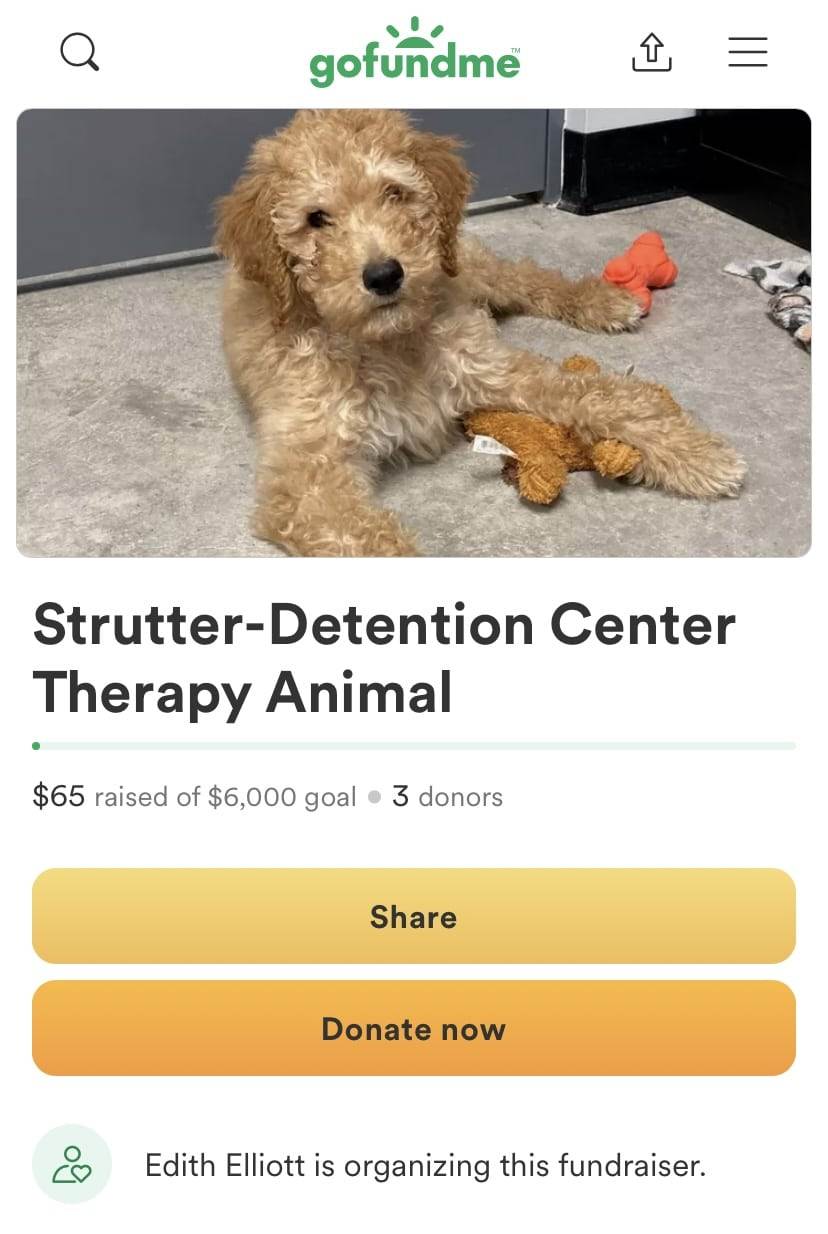A go-fund-me has been set up for a new cause at the Sharp County Detention Center. According to the account, created by Jail Administrator Edith Elliot, the funds will be used to train Strutter, a three-month-old Golden Doodle to become a therapy animal at the detention center.
“Our facility, like most, is operated with tax dollars, which are limited in use and unavailable for this type of program. Stutter will, if funded, be trained at Creating Companions and spend a total of eight weeks learning his new role,” Elliot said. “After an abundant amount of research, I’ve found there is grant funding available for K-9 units, but none for therapy dogs. Strutter’s purpose will be to diffuse high-emotional situations and to help with inmate mental health.”
At a time when experts are scrambling for solutions and relief to the ongoing and growing mental health crisis, Elliot said research backs the efforts to obtain a therapy dog.
“Studies have shown therapy animals decrease anxiety, improved behavior, and anger management skills, and more benefits. Helping inmates to acclimate to imprisonment/detention is paramount to their behavior while incarcerated,” Elliot said. “The emotional strain will be less consuming, and once released, the chances of recidivism are decreased as an inmate’s mental health has not been as temperamental.”
According to a study conducted by the National Library of Medicine’s National Center for Biotechnology Information (NLM) , when incarcerated inmates may suffer from depression, anxiety and/or a loss of empathy.
In the study, animal-assisted therapies and in concrete dog-based assisted therapy was introduced into prison systems. In many cases, the animals were trained therapy dogs, but other programs such as Paws in Prison, one program which is utilized locally at the Arkansas Department of Correction’s North Central Unit in Calico Rock.
“Results showed that mental health, emotional control, empathy, or academic skills could be improved after dog-based assisted therapy. Most of the studies included activities related to dog training, dog caring, or activities. The duration of dog-based therapies ranged between 60 and 120 min, with the frequency being between 1 and 3 days/week. In conclusion, these potential enhancements might lead to a reduction in recidivism and violence,” the NLM’s study concluded.
The Arkansas Department of Corrections (ADC) has come to a similar conclusion through their Arkansas Paws in Prison Program which is designed to rehabilitate inmates and give rescue dogs a second chance at life by preparing them to be loving, obedient, adoptable pets.
“The program pairs inmate trainers with rescue dogs for eight to ten weeks of obedience training and socialization in preparation for adoption… Arkansas paws in Prison strives to decrease recidivism rates by providing incarcerated individuals the opportunity to give back to the community and acquire skills that support successful rehabilitation and reentry to society,” a representative from the ADC said.
Currently, the ADC has expanded the program to seven prison facilities throughout the state and has seen success with the program.
To support the efforts of the Sharp County Detention Center, donations may be made by going to https://na01.safelinks.protection.outlook.com/?url=https%3A%2F%2Fwww.gofundme.com%2Ff%2Fstrutterdetention-center-therapy-animal%3Futm_campaign%3Dp_cp%2Bshare-sheet%26utm_content%3Dundefined%26utm_medium%3Dcopy_link_all%26utm_source%3Dcustomer%26utm_term%3Dundefined%26mibextid%3DZxz2cZ&data=05%7C01%7C%7C7feef2c38fbe40b141a108db310a1b18%7C84df9e7fe9f640afb435aaaaaaaaaaaa%7C1%7C0%7C638157691692535658%7CUnknown%7CTWFpbGZsb3d8eyJWIjoiMC4wLjAwMDAiLCJQIjoiV2luMzIiLCJBTiI6Ik1haWwiLCJXVCI6Mn0%3D%7C3000%7C%7C%7C&sdata=FYjw1dKzBwc6gplZZZQmhxdSdSb9%2FvBpi1keb%2BVhD1o%3D&reserved=0.
Donations may also be made at the Sharp County Sheriff’s Department.
Lauren is a an award-winning journalist who decided after 10 years of newspaper experience to venture out. Hallmark Times was born.






